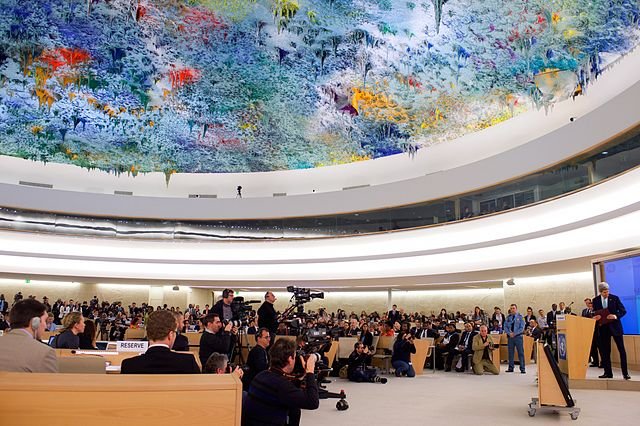The UN Human Rights Council’s Universal Periodic Review (UPR) Working Group examined the human rights record of China, one of the 14 states reviewed during this year’s session, for the fourth time on Tuesday in a meeting at Geneva. The three previous UPR reports on China—which took place separately in February 2009, October 2013, and November 2018—served as the basis for the Tuesday review.China stated it has made significant achievements in improving human rights of different areas. According to the report, between 2014 and 2022, the national net rate of enrollment in primary schools increased from 99.81 percent to 99.9 percent. During the same time, the gross enrollment rate in junior secondary schools remained above 100 percent. Regarding the civil rights, China pointed out that the amendment of the Legislation Law of the People’s Republic of China and the implementation of the Regulation on the Disclosure of Government Information contribute to protecting people’s rights to information, participation, expression and oversight.Chen Xu, permanent representative of China to the UN office at Geneva and other international organizations in Switzerland, asserted that many representatives of developing countries confirmed in their statements that China’s path to human rights development was in line with China’s national conditions and the aspirations of its people. Chen said, “China has taken a path of human rights development that conforms to the world trend and suits China’s national conditions, and will firmly promote global human rights governance toward greater fairness, justice, rationality and inclusiveness.”However, Chen also argued that some countries leveled “groundless” accusations against China based on ideological bias, rumors and lies. In the Advance Question published by UPR last Friday, several Western countries raised questions concerning freedoms of speech and expression in Hong Kong and human rights abuses in Xinjiang and Tibet—among other ethnic minority regions.For example, the implementation of the 2020 National Security Law (NSL) sparked broad concerns about its potential implications to civil rights and democracy in Hong Kong. The UN Human Rights Council in 2022 called for the repeal of NSL and requested assurances that members of civil society in Hong Kong will not be prosecuted under the NSL. During the review of China, the US argued that China and Hong Kong authorities’ transnational repression efforts threaten the rules-based international order and are incompatible with respect for human dignity. The US also questioned the Chinese government’s justification for undertaking such actions. By contrast, China’s report stated that the media may exercise their freedom of expression in accordance with the law, and comment on—or even criticize—the work of the HKSAR government.In term of human rights issues in Xinjiang, the UN Office of the High Commissioner for Human Rights (OHCHR) in a 2022 report found “credible allegations of patterns of serious human rights violations” in China, especially against Xinjiang Uyghurs, an Muslim ethnic minority that predominately resides in the region. Relatedly, Human Rights Watch (HRW) criticized China in their 2024 report for undermining global institutions like the UN Human Rights Council. HRW claimed that China also undertook efforts to silence critics and dissidents from other regions and countries.In response to these criticisms, China responded in its fourth report that China’s ethnic-minority population was about 125 million, according to 2020 census data. This figure marked an increase of more than 11 million since the last population census in 2010. China also claimed it has achieved free education, spanning kindergarten through high school, in some regions of Tibet and Xinjiang.The UPR was established when the Human Rights Council was created on March 15, 2006 by the UN General Assembly in resolution 60/251. The aim of the UPR is to promote, support and expand the worldwide protection of human rights. This unique mechanism of the Human Rights Council requires each UN Member State to undergo a peer review of its human rights records every 4.5 years. It enables each nation to report on actions it has taken to improve the human rights situation and receive recommendations from other member states for future improvement.



The Most Read
Сryptocurrencies
Bitcoin and Altcoins Trading Near Make-or-Break Levels
Financial crimes
Thieves targeted crypto execs and threatened their families in wide-ranging scheme
Financial crimes
Visa Warning: Hackers Ramp Up Card Stealing Attacks At Gas Stations
News
Capitalism is having an identity crisis – but it is still the best system
Uncategorized
The 73-year-old Vietnamese refugee is responsible for bringing Sriracha to American consumers
Uncategorized
Electric Truckmaker Rivian, Backed By Amazon, Ford, Raises Whopping $1.3 Billion